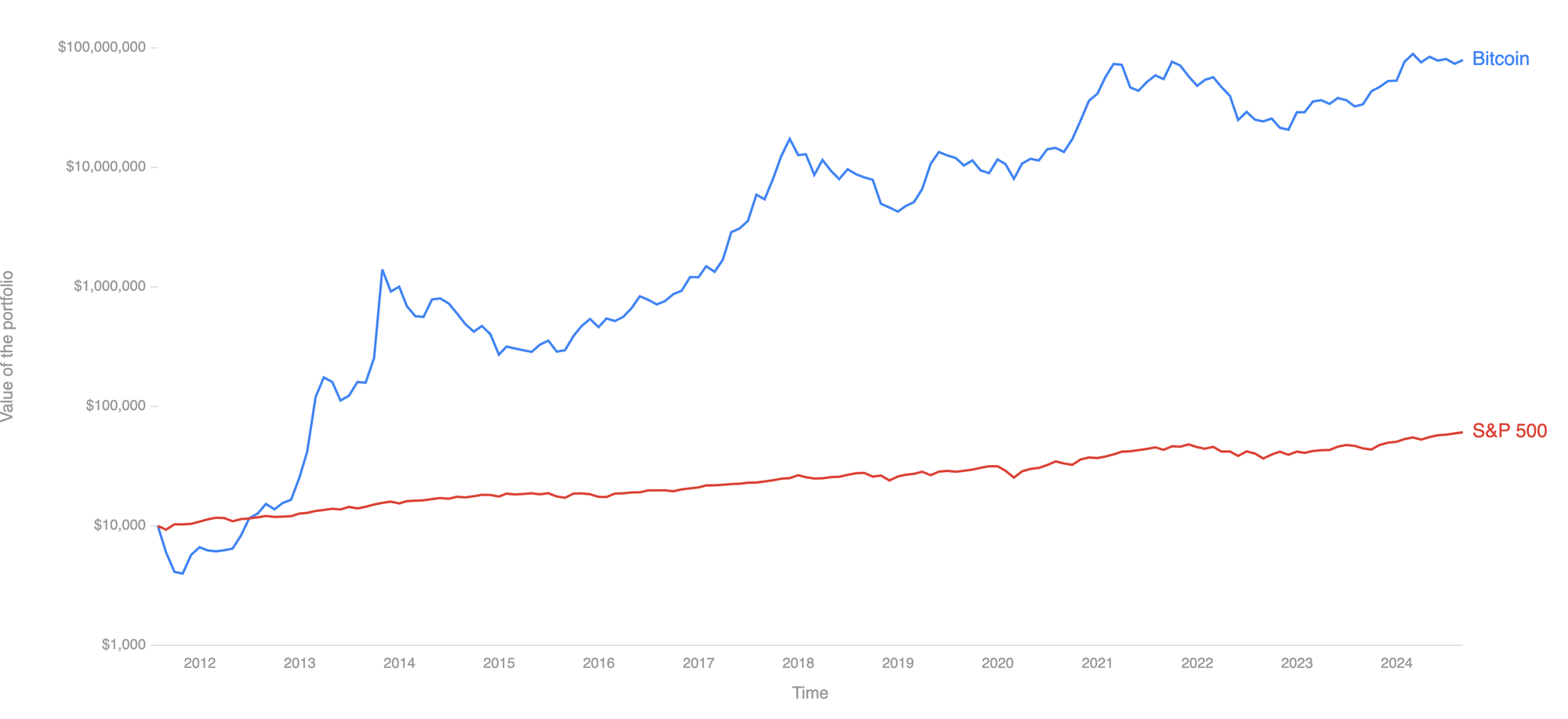Future of Bitcoin: Michael Saylor's Bold Prediction (and What Families Should Take From It)

If you're not familiar, Michael Saylor is a key figure in the Bitcoin space. He co-founded and chairs MicroStrategy. Saylor's convictions have shaped market trends and influenced Bitcoin adoption, making MicroStrategy a leading Bitcoin advocate.
The $13 million bitcoin prediction
Saylor believes increased adoption and reduced volatility will boost Bitcoin's value.
"I forecast is $13 million a coin by the year 2045, and what I tell everybody is every bitcoin you don't buy today is going to cost you $13 million in the future."
That’s a 29% annual return over 21 years. As more people and institutions use Bitcoin, its market stability should improve, making it a more attractive investment.
Political influence on Bitcoin's trajectory
Politics affects Bitcoin's future. Saylor suggests Republican control in Washington could lead to Bitcoin-friendly policies, boosting its value. Recent Republican wins, like Donald Trump's, are seen as positive for Bitcoin. Supportive laws and a potential strategic Bitcoin reserve could impact market dynamics.
MicroStrategy's ongoing strategic Bitcoin acquisition
Under Saylor, MicroStrategy leads in Bitcoin acquisition, holding 386,700 bitcoins as of November 25, 2024.
How?
The company raises funds through convertible bonds to expand its Bitcoin holdings, showing strong commitment to its strategy. This approach highlights MicroStrategy's confidence in Bitcoin's long-term potential and sets an example for other companies.
Bitcoin as a superior capital asset
Saylor sees Bitcoin as a superior asset compared to traditional indices like the S&P 500.

He argues Bitcoin's long-term value makes it attractive for investors seeking sustainable returns. As Bitcoin's volatility decreases, its appeal as a reliable investment and superior savings vehicle grows, challenging traditional investment methods.
Implications for Bitcoiners and their families
Saylor's predictions offer a framework for integrating Bitcoin into daily life. Embracing Bitcoin means acquiring it and fostering values of honesty, hard work, and optimism.
Normalizing Bitcoin principles will empower families to prepare for a future where Bitcoin is central to financial planning and wealth management, which ultimately allows you to do more with your scarcest asset — your time.
5 Practical takeaways for families moving toward a Bitcoin standard
1. Educate and involve family members
Discuss Bitcoin's potential and role in future financial systems. Encourage family discussions about Bitcoin's benefits and risks to foster a collective approach. It doesn't need to be formal either.
Eating a meal as a family? Just bring it up! For younger kids, read Bitcoin children's books, play Bitcoin card and board games, or just try to guess the price. If you've ever had a 5-year-old guess your age, their Bitcoin price estimates might be legitimately good (i.e., high haha).
Choose a Bitcoin podcast to listen to with older kids and ask them questions about it! Set them up with a lightning wallet and pay them in Bitcoin for work they do around the house.
And here's a novel idea: before you do any of the above — especially if you are doing the educating — read the Bitcoin White Paper!
2. Adopt a long-term investment and saving mindset
Emphasize patience and long-term planning in Bitcoin investment. Consider Bitcoin as part of a long-term financial strategy, not a quick profit.
You could set a family goal to hold Bitcoin for at least five years (i.e., more than one four-year cycle).
This might seem hard but it becomes much easier when you commit to holding it from the time a child is born to the time they leave and cleave, or holding it until a marriage anniversary milestone.
Saylor's expection an annual return of 29% over 21 years, after all.
3. Incorporate Bitcoin into financial planning
Integrate Bitcoin into financial plans. Set aside a portion of savings for Bitcoin investment or use Bitcoin for certain transactions. For example, allocate 1-5% of monthly savings to buy Bitcoin as a starting point.
Take a minute and ask yourself what 5% of your monthly savings in Bitcoin would be worth at $13,000,000.
It's an oversimplification, I know. But chances are it instills a sense of urgency to incorporate Bitcoin into your financial plans.
Brian Harrington works at Fold and is a proponent of looking at your household in both currencies (i.e., dollars and Bitcoin). If you're in the U.S., you can use an app like Fold but you can also adjust your spreadsheet budget to have a Bitcoin for every line item.
In Google Sheets, import Bitcoin's live price using the formula =GOOGLEFINANCE("BTC-USD").
4. Promote Bitcoin literacy
Enhance financial literacy by learning about Bitcoin (and why other cryptocurrencies are inferior).
Read books, watch videos, listen to podcasts, attend meetups and conferences. But arguably the most effective thing to do is use Bitcoin — save in it, spend it, "play" with it, send it to cold storage.
Ben Perrin aka BTC Sessions has fantastic free, step-by-step videos covering everything from Bitcoin node setups, hardware wallet tutorials, and more.
Using Bitcoin in all the ways it invites you will both increase your literacy and confidence with this freedom technology.
5. Foster values of hard work and optimism
Align Bitcoin adoption with values like hard work, honesty, and optimism.
Bitcoin's very own consensus mechanism, proof of work (PoW), requires energy to mine new blocks. It's a helpful illustration that families can look to to be better. Strong, healthy relationships require work; strong healthy bodies require work.
And in a time when the world seems to be going down the gutter, Bitcoin is a beacon of hope. It's a tangible tool that respects your time and energy so that you can — sooner or later — do what matters most to you.
Adopting these steps will help families move closer to a Bitcoin standard, positioning themselves to benefit from Bitcoin's growth and stability.
From my Bitcoin family to yours,
J